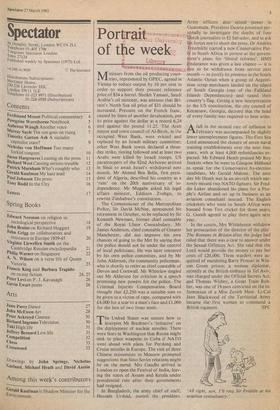Portrait of the week
Ministers from the oil producing coun- tries, represented by OPEC, agreed in • Vienna to reduce output by 10 per cent in
order to support their present reference price of $34 a barrel. Sheikh Yamani, Saudi Arabia's oil minister, was anxious that Bri- tain's North Sea oil price of $31 should be increased. Pressure on the French franc, caused by fears of another devaluation, put its price against the dollar at a record 6.24 and against the pound 11.25. The Arab mayor and town council of Al-Bireh, in the occupied West Bank, were evicted and replaced by an Israeli military committee; other West Bank towns declared a three- day strike, rioting followed and at least two Arabs were killed by Israeli troops. US paratroopers of the 82nd Airborne arrived in Sinai to await Israel's withdrawal next month. Mr Ahmed Ben Bella, first presi- dent of Algeria, described his country as a `ruin' on the 20th anniversary of in- dependence. Mr Mugabe asked his legal affairs minister, Eddison Zvobgo, to rewrite Zimbabwe's constitution.
The Commissioner of the Metropolitan Police, Sir David McNee, announced his retirement in October, to be replaced by Sir Kenneth Newman, former chief constable of the Royal Ulster Constabulary. Mr James Anderton, chief constable of Greater Manchester, did not improve his own chances of going to the Met by saying that the police should not be under the control of local politicians. He was later censured by his own police committee, and by Mr John Alderson, the community policeman, who is shortly to retire as chief constable of Devon and Cornwall. Mr Whitelaw singled out Mr Alderson for criticism in a speech promising new powers for the police. The Criminal Injuries Compensation Board thought that £2,250 was a suitable sum to be given to a victim of rape, compared with £4,000 for a scar to a man's face and £1,000 for the loss of two front teeth.
he United States was unsure how to interpret Mr Brezhnev's 'initiative' on the deployment of nuclear missiles. There were fears in Washington that Russia might seek to place weapons in Cuba if NATO went ahead with plans for Pershing and Cruise missiles in Europe. The visit of three Chinese economists to Moscow prompted suggestions that Sino-Soviet relations might be on the mend. Mrs Gandhi arrived in London to open the Festival of India, leav- ing the states of Assam and Kerala under presidential rule after their governments had resigned.
In Bangladesh, the army chief of staff, Hussain Urshad, ousted the president.
Army officers also seized power in ,Guatemala. President Duarte promised per- sonally to investigate the deaths of four Dutch journalists in El Salvador, and to ask his forces not to shoot the press. Dr Andries Treurnicht started a new Conservative Par- 6? in South Africa in protest at the govern- ient's plans for 'liberal reforms'. HMS endurance was given a last chance — it is due to be withdrawn from service next month — to justify its presence in the South Atlantic Ocean when a group of Argenti- nian scrap merchants landed on the island of South Georgia (one of the Falkland Islands Dependencies) and raised their country's flag. Giving a new interpretation to the US constitution, the city council of Kennesaw, Georgia, decreed that the head of every family was required to bear arms.
A fall in the annual rate of inflation in riFebruary was accompanied by slightly lower unemployment figures. The First Sea Lord announced the closure of seven naval training establishments over the next four years, with at least 4,000 redundancies ex- pected. Mr Edward Heath praised Mr Roy Jenkins when he went to Glasgow Hillhead to speak for the Conservative by-election candidate, Mr Gerald Malone. The next day Mr Heath was in an aircraft which nar- rowly missed two NATO fighters. Sir Fred- die Laker abandoned his plans for a Peo- ple's Airline and set up in business as an aviation consultant instead. The English cricketers who went to South Africa were banned from Test cricket for three years; G. Gooch agreed to play there again next year.
In the courts, Mrs Whitehouse withdrew her prosecution of the director of the play The Romans in Britain after the judge had ruled that there was a case to answer under the Sexual Offences Act. She said that the Lord would provide the money to pay her costs of £20,000. Three warders were ac- quitted of murdering Barry Prosser in Win- son Green prison; a woman diplomat, recently at the British embassy in Tel Aviv, was charged under the Official Secrets Act; and Thomas Wisbey, a Great Train Rob- ber, was one of 19 men convicted on the in- formation of a Miss Zenith Meer. Lt-Col Jean Blackwood of the Territorial Army became the \ first woman to command a
'All right, son, I'll ring Sir Freddie at his aviation consultancy.'




































 Previous page
Previous page